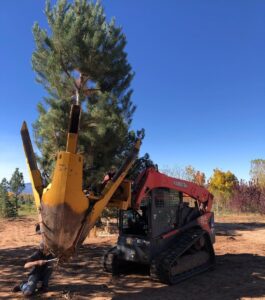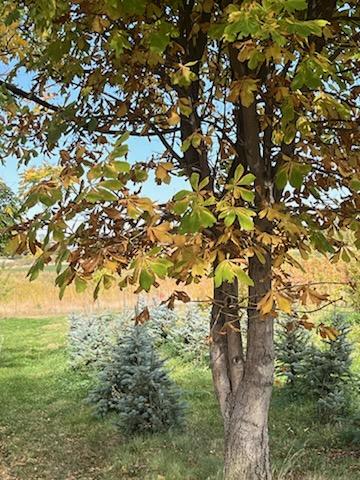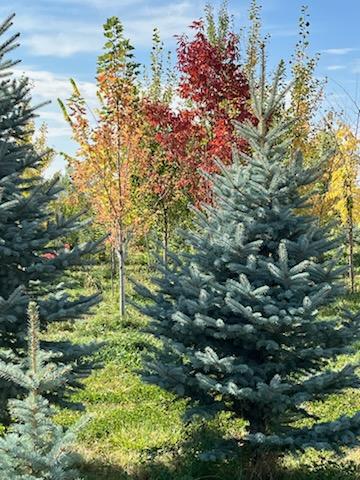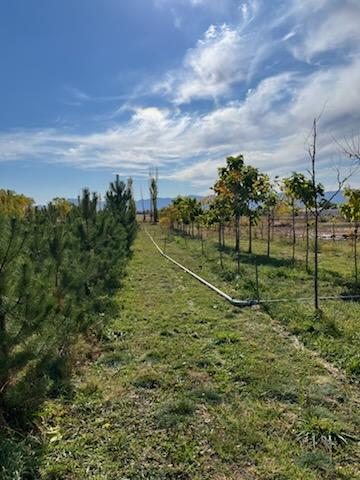Megan and Clay Tallmadge Reveal Keys to Superb Fostering Are Time and Dirt
For eight years, Megan and Clay Tallmadge have mastered the ins and outs of fostering young ones whose lives were literally uprooted. Not necessarily kidnapped, but definitely plucked out of their home turf and in need of a new abode. To nurse these youngsters through the tough transition, the Tallmadges dispense hearty servings of dirt. Enriched dirt, of course.
“The more life we can bring into the soil, the more likely they are to have strengthened themselves to make it through the winter…and some of our harsh springs,” explains Megan Tallmadge, co-owner of Pleasantree Farm, a source for superior trees and shrubs adapted to the high desert climate of the Rocky Mountains.
“A lot of our stock comes from the Oregon-Idaho area,” she notes. “They’re used to a different world. Humidity levels, all of the seasons are very different, and the winds, and our extreme fluxes in temperatures—those are all very different.”
Time and Dirt
Whether one thinks of the farm in Dolores, Colorado as a tree nursery or as orphanage or for uprooted and rebooted plants, the investment to acclimatize the relocated trees is significant. The Tallmadges care for about 4,000 trees spread out on 20 acres near Dolores, Colorado. They have about 80 different species of deciduous trees and 10 varieties of conifers. Shade trees, fruit trees, ornamentals, and shrubs all take up residence on the farm for a span of 3 to 8 years, depending on the species.
 The advantage of getting trees from Pleasantree centers around that substantial time. Their stock has been given time to adapt. And because their trees are more developed, they are sold “balled and burlapped.” Megan explains how this requires digging a tree out of the ground and bundling its roots in burlap. Other nurseries opt to grow trees in pots, which demands a shorter growing period and makes the trees easier to transport for delivery. Pleasantree stock has had time to actually dip its toes into the local soils and taste the local nutrients.
The advantage of getting trees from Pleasantree centers around that substantial time. Their stock has been given time to adapt. And because their trees are more developed, they are sold “balled and burlapped.” Megan explains how this requires digging a tree out of the ground and bundling its roots in burlap. Other nurseries opt to grow trees in pots, which demands a shorter growing period and makes the trees easier to transport for delivery. Pleasantree stock has had time to actually dip its toes into the local soils and taste the local nutrients.
“They’ve kind of grown up in the area, in the soil, in the ground and can shift easier,” Megan muses.
Pleasantree relies on Table to Farm’s food scrap compost to buoy resilience and spur growth in their young trees. Before new arrivals are planted, compost is mixed into the soil. For more established trees, it is applied as a top-dressing. Megan says, “We also make a compost tea with the compost mixed with a bunch of other things that we spray throughout the year to help them absorb more from the soil, the air, and stay healthier that way.”
The couple sought out T2F because it was a locally-produced soil amendment. “We’re saving on the gas from driving it from who knows where,” Megan says. “And they’ve proven to have a really good product that’s really nourishing to the trees; that doesn’t have residues of toxins from manures that we’ve run into in the past. This is a good, complete product that we’ve found is really beneficial to the trees.”
The Tallmadges find it especially crucial to apply additional compost just before winter sets in. “They’re making food with their leaves, the deciduous are, and they’ll drop those, and so the compost is nourishing them from the bottom up,” Megan explains.
Compost also plays an important role in helping trees get established at their new forever-home, whether that is at a residence improving its landscaping, or at a commercial site boosting its curb appeal. “That time when they’re making the transition to a new site or new home,” Megan notes, “they’re being nourished by the compost with a gentle amount of nutrients. We really prefer a compost for that planting and that adjustment time when we want the roots to take off. So, a good amount of compost just adds that softer entrance.”
The trees and shrubs from Pleasantree Farm enjoy a long incubation period (up to eight years in some cases), acclimatizing to the local seasons and soils. As a result, they are robust and ready to join luxurious landscaping projects.
Barking Up the Right Tree
The Tallmadges’ love for nature and the trees they tend comes across in the way they speak about the trees as if they were adopted children. But, running a tree farm was never part of the couple’s dreams for their future. “I come from a family of farmers in Eastern Colorado and have always dreamed of farming,” Megan explains, going on to say that she had always imagined growing produce. Clay, however, had zero interest in managing food crops. Megan chuckles, “He didn’t necessarily want to pick tomatoes and lettuce.”
Meanwhile, the original owners of Pleasantree had launched the tree farm in the 1990s and by 2017, were ready to retire. They offered the business to the Tallmadges. The couple readily accepted a deal that came with land, stock already in development, a client roster, and orders in the pipeline. They set to work and ran a tight crew with a few part-time workers plus their young children to help. As time passed, the Tallmadges discovered that they influenced the trees as much as the trees influenced them. Two of the three children have gone to college to study biology and environmental studies. And, Clay and Megan have developed a keen appreciation for the trees’ beauty and bounty.
As Megan points out, “These trees are here for generations. And they can offer so much to an environment, to someone’s yard or landscape. It does so much not only for shade on the house, protection from the wind, and privacy, but also for animal habitats, for the soil biology—the whole unit. Our trees are really important to our landscape and it’s been really fun to watch [them] grow or driving by homes with trees of ours and watching them become full-grown, beautiful fixtures; knowing that they’ll be there for a long time.”
For the Tallmadges, the line between child and tree, offspring and offshoot, is easily blurred. What’s clear is their passion for cultivating young ones who branch out; who go on to become greater forces of good in the wider world.
To learn more about Pleasantree Farm, visit them online or call 970-946-5763 to schedule a time to visit the nursery in Dolores, Colorado.





